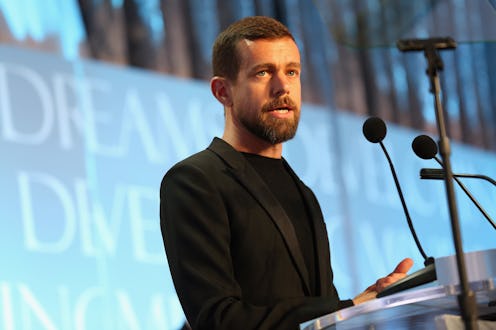News
Tech CEOs Are Finally Joining The Gun Control Debate, But There's A Catch

On Tuesday, a mass shooting at the headquarters of YouTube in San Bruno, California injured several people, sending shock-waves through Silicon Valley. Somewhat forced to now confront the issue, tech CEOs have begun speaking out about gun violence in the hours since, although some have been more guarded in their language than others. And, given the extremely polarized nature of gun politics in the United States, it's unclear whether even vigorous advocacy from tech industry leaders would have an impact on public opinion.
Of the CEOs who spoke out following the YouTube shooting, Twitter CEO Jack Dorsey was perhaps the most explicitly political. He tweeted on Tuesday that America's policies towards guns and gun violence need to "evolve," and included a link to the March For Our Lives website.
"We can’t keep being reactive to this, thinking and praying it won’t happen again at our schools, jobs, or our community spots. It’s beyond time to evolve our policies," Dorsey said, in response to a tweet by President Donald Trump addressing the YouTube shooting.
The link he included directs to a list of five policy ideas to help save lives and reduce gun violence, including universal background checks, funding research into gun violence, and banning high-capacity magazines. Dorsey called these ideas "simple and reasonable," while acknowledging that they won't solve the problem entirely.
The issue of universal background checks in particular illustrates the difficulty of affecting political change on guns. Despite recent polls showing a staggering 95 percent of Americans supporting the idea, the U.S. Congress has failed to act, owing in large part to the lobbying efforts of the NRA.
Dara Khosrowshahi, the CEO of Uber, also weighed in on Twitter on Tuesday. Although he did use the hashtag #EndGunViolence, which is typically associated with support for gun control, he was less explicit about calling for changes to the law than Dorsey was.
"On behalf of the team at @Uber, sending support to everyone @YouTube and @Google, and gratitude to the heroic first responders," Khosrowshahi said. "Another tragedy that should push us again to #EndGunViolence."
As Yahoo detailed on Tuesday, Google CEO Sundar Pichai and YouTube CEO Susan Wojcicki both put out statements expressing sympathy and heartbreak over the shootings, although they shied away from any open advocacy for new gun laws. Google, it should be noted, is YouTube's parent company.
"There are no words to describe the tragedy that occurred today. @SusanWojcicki & I are focused on supporting our employees & the @YouTube community through this difficult time together," Pichai tweeted on Tuesday. "Thank you to the police & first responders for their efforts, and to all for msgs of support."
Pichai also sent out a memo to Google employees following news of the shooting, detailing what happened, and expressing sadness over the "horrific act of violence."
"I know a lot of you are in shock right now. Over the coming days, we will continue to provide support to help everyone in our Google family heal from this unimaginable tragedy," Pichai wrote. "Let's everyone come together now to support Susan and the YouTube team."
It remains to be seen whether tech CEOs speaking out will have any broader impact on the ongoing national debate on gun violence. Mass shootings, and particularly school shootings, have been receiving heightened focus for the last couple of months, ever since the deadly shooting at Stoneman Douglas High School in Parkland, Florida on Feb. 14.
Following the shooting, many students who survived dove into activism in support of gun control, efforts which culminated in the massive March For Our Lives last month. The students' efforts have seemingly succeeded in keeping gun violence a highly visible issue in the national consciousness, even though the GOP's historical intractability on the issue leaves the odds of meaningful reform pretty low.
Needless to say, the leaders of huge tech companies would in a traditional sense be seen as having a bigger platform than, say, the teenage victims of a school shooting. But given the big platform some of the Parkland students have received, there's no guarantee that multimillionaire or billionaire CEOs speaking out ― in some cases in extremely reserved and tentative terms ― will be any more successful in moving politicians to act.